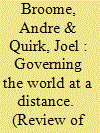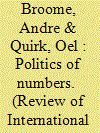|
|
|
Sort Order |
|
|
|
Items / Page
|
|
|
|
|
|
|
| Srl | Item |
| 1 |
ID:
142232


|
|
|
|
|
| Summary/Abstract |
Benchmarking practices have rapidly diffused throughout the globe in recent years. This can be traced to their popularity amongst non-state actors, such as civil society organisations and corporate actors, as well as states and international organisations (IOs). Benchmarks serve to both ‘neutralise’ and ‘universalise’ a range of overlapping normative values and agendas, including freedom of speech, democracy, human development, environmental protection, poverty alleviation, ‘modern’ statehood, and ‘free’ markets. The proliferation of global benchmarks in these key areas amounts to a comprehensive normative vision regarding what various types of transnational actors should look like, what they should value, and how they should behave. While individual benchmarks routinely differ in terms of scope and application, they all share a common foundation, with normative values and agendas being translated into numerical representations through simplification and extrapolation, commensuration, reification, and symbolic judgements. We argue that the power of benchmarks chiefly stems from their capacity to create the appearance of authoritative expertise on the basis of forms of quantification and numerical representation. This politics of numbers paves the way for the exercise of various forms of indirect power, or ‘governance at a distance’, for the purposes of either status quo legitimation or political reform.
|
|
|
|
|
|
|
|
|
|
|
|
|
|
|
|
| 2 |
ID:
142231


|
|
|
|
|
| Summary/Abstract |
Global benchmarks have grown exponentially over the last two decades, having been both applied to and developed by states, international organisations, corporations, and non-governmental organisations. As a consequence, global benchmarking is now firmly established as a distinct mode of transnational governance. Benchmarking chiefly involves the development of comparative metrics of performance, which typically take the form of highly stylised comparisons which are generated by translating complex phenomena into numerical values via simplification and extrapolation, commensuration, reification, and symbolic judgements. This process of translation takes what might otherwise be highly contentious normative agendas and converts them into formats that gain credibility through rhetorical claims to neutral and technocratic assessment. This politics of numbers has far-reaching ramifications for transnational governance, including the dimensions and effects of indirect power, expertise and agenda-setting, coordination, regulation and certification, and norm contestation and activism. This Special Issue draws upon an emerging literature to explore how and why benchmarks both align with and expand upon established models of International Relations theory and scholarship. It does so by critically examining the role of global benchmarks in key areas such as state ‘failure’, global supply chains, disaster management, economic governance, corporate social responsibility, and human development.
|
|
|
|
|
|
|
|
|
|
|
|
|
|
|
|
|
|
|
|
|